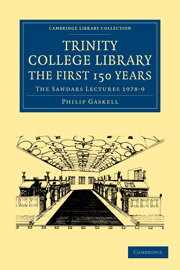Book contents
- Frontmatter
- Contents
- Lists of illustrations and plans
- Preface
- Terms and conventions
- Abbreviations
- 1546–1600
- 1601–1695
- 9 The New Library
- 10 Stanhope's Librarianship
- 11 Collections of manuscripts
- 12 The growth of the working collections, 1601–40
- 13 The arrangement of the books, 1601–40
- 14 Administration and reorganisation, 1641–74
- 15 The book stock, 1667–95
- 16 The last years of the New Library
- APPENDIXES
- Index
11 - Collections of manuscripts
Published online by Cambridge University Press: 05 August 2011
- Frontmatter
- Contents
- Lists of illustrations and plans
- Preface
- Terms and conventions
- Abbreviations
- 1546–1600
- 1601–1695
- 9 The New Library
- 10 Stanhope's Librarianship
- 11 Collections of manuscripts
- 12 The growth of the working collections, 1601–40
- 13 The arrangement of the books, 1601–40
- 14 Administration and reorganisation, 1641–74
- 15 The book stock, 1667–95
- 16 The last years of the New Library
- APPENDIXES
- Index
Summary
In 1600 Trinity did not possess a single one of the superb medieval manuscripts which it now counts amongst its greatest treasures, the only manuscript books in the College Library then being the humanistic manuscript of Athanasius given by Christopherson in the 1550s, and possibly a copy of Nicholas Trivet's Annales, of unknown provenance. Then all of a sudden the College was presented with about 330 manuscripts of outstanding quality, in two large collections given by Whitgift and Nevile, and two small ones given by Stanhope and Willmer. These gifts were not of workaday academic and liturgical manuscripts such as Trinity is likely to have inherited from Michaelhouse and the King's Hall and to have lost or discarded between 1546 and 1600, but chiefly of splendid books dispersed from the great monastic libraries at the dissolution, books which had been deliberately preserved by sixteenth-century collectors.
In preserving books from the monastic libraries, Leland, Bale, Matthew Parker, and other sixteenth-century antiquaries were especially concerned to save individual texts which, they saw, were in danger of being lost for ever; and Parker wanted in particular to preserve the texts of historical works that would justify the Elizabethan Church Settlement. There were other reasons, too, for collecting monastic manuscripts. Some must have survived simply because they seemed beautiful or curious; others, apparently, because book-collectors of the sixteenth century, like those of other periods, were sometimes motivated by the urge to accumulate books just for the sake of acquiring and possessing them.
- Type
- Chapter
- Information
- Trinity College Library. The First 150 YearsThe Sandars Lectures 1978–9, pp. 79 - 85Publisher: Cambridge University PressPrint publication year: 2010First published in: 1980

